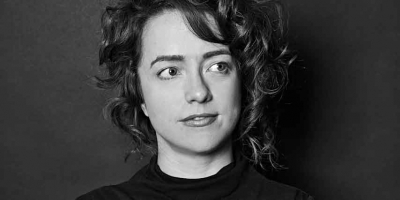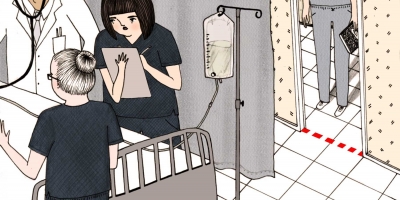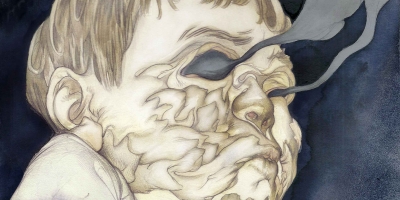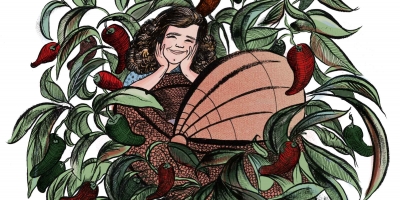Nonfiction
Nossa Família
by Sofia Soter Henriques

My grandfather came to Brazil on a mission from God.
At the age of thirty-five, he had a vision in his sleep. The next morning, he told his wife and son that there was nothing in Portugal for them anymore, that new opportunities lay ahead in Brazil. He told his boss he was quitting. His boss thought he was mad, told him he could have his job back if in a year things didn’t work out as he hoped. He told his family he was leaving. They thought he was mad, told him they wouldn’t hold it against him if he gave up and came back in a few months. He never went back.
They settled in a poor immigrant neighborhood in Rio. My grandfather found a job with a rice company in the suburbs—he still drives there every morning. My grandmother was a housewife, as all nice Christian Portuguese women of her generation were taught to be, and she made wedding dresses with her sewing machine to sell to richer (non-immigrant) housewives. My father got a good education, majoring in economics at a top university, getting a master’s degree soon after, going to France for a doctorate. He wore long hair and earrings, drove a motorcycle, and campaigned in favor of the Communist Party, so once in a while my grandfather, as all nice Christian Portuguese men of his generation were taught to do, threw him out of the house and threatened to disown him.
At least that’s what I think happened. It’s what I’ve sewn together from pieces of stories told by my parents, from the occasional picture found deep in a box, from the lack of pictures of my father before the age of twenty (the only exception being a roll of film that features him and my grandparents at the beach—my grandparents looking like Old Hollywood stars, my grandfather the spitting image of Clark Gable). Maybe I’m wrong about the story, maybe I’m missing the most important pieces, maybe I have them and don’t know where they fit in the puzzle: my grandmother admitting she didn’t have the same blind faith in God as my grandfather but that she loved him too much for it to matter; my grandfather forbidding my father from learning the guitar, my father becoming a jazz fan who played the saxophone; my grandfather’s friends, now in a nicer immigrant neighborhood, with their heavy accents and heavier mustaches, watching soccer matches together at the corner grocery store.
I don’t really know what sort of contact my grandparents maintained with their—our—family back in Europe. I know my father’s godmother called him every birthday until her death. I know there were letters I found when I helped my father move out of our house. I know there were emails, back when emails were a novelty around these parts, and I remember sitting by my grandfather’s computer as we waited for a picture to download, piece by piece, so he could see his grandnephew’s face for the first time. I know my grandfather saw his family again twice, both trips made at the urging of my father, after I was born. My grandfather cried both times, yet I never heard him mention them again. I wonder if he saw them other times, before I was born, and just also never mentioned them again.
A few months ago, I woke up to a message on Facebook, buried in my “Others” folder:
SOFIA I FOUND YOU, HOW ARE YOU?
KISSES
(All the Facebook posts/messages I mention were originally written in Portuguese. These are not-so-loose translations, keeping the original unorthodox punctuation and grammar.)
It was sent from a pictureless profile, with my grandfather’s name—last name first, first name last, betraying a mistranslation between Brazilian Portuguese and European Portuguese. Shortly after, he added me. I texted my mother and my sister, asking if he had added them too. They said he had. I called my father, who had also been added. My grandfather was really on Facebook.
My sister and I opened his profile. He had added not only us, but also a ton of other family members, family members who were still in Portugal, who were near his age, who were also unclear on the limits of private and public on the internet. As a result, we started to see my grandfather’s interactions with his—our—family unfold in front of our eyes. He didn’t need to talk to us about it anymore. We could see it for ourselves.
The first person to post on his wall was his brother. An all-caps message of incredulity, a very accurate translation of what I felt:
WELL… I DON’T EVEN WANT TO BELIEVE IT… IS IT REALLY YOU…????
My incredulity came from the fact that my grandfather is eighty-four years old and doesn’t understand technology all that well. I came to learn, later, that a friend from work—one with a bigger (closer) family, probably lots of kids and siblings and grandkids and nephews to teach him how to be a “cool grandpa” on the internet—had set up his profile for him, insisting it would be fun. “It’ll help you distract yourself at work when you’re bored,” he said. “You might even catch up with some old friends.”
My grandfather’s brother’s—my great-uncle’s, I have to keep reminding myself—disbelief probably had added layers: the surprise of seeing his brother’s name pop up when he didn’t expect to hear from him, the fact that his brother, well into what we might call his old age, was making his debut in social networks.
And then the interactions multiplied.
My sister posted a sweet yet slightly joking message in all-caps on my grandfather’s wall. Shortly after, distant cousins and relatives I couldn’t even try to place on a family tree started commenting on it. “I can’t believe my cousin is that big already!” “HAHA OLD MAN YOU’RE SUCH A SOFTIE” “Your granddaughters are sweet, I hope we can meet them soon” “What about me, great-niece, don’t I get a Facebook hug too?”
A woman who shares my last name but whose face I don’t recognize, even though I’ve tried to find the similarities in a mirror, told my grandfather he’s missed. She posted a picture of herself with some family members. I still don’t know a single one of them.
My grandfather shares strange posts, clickbait, the sort of thing with a URL that tricks you into autosharing. One of these posts is called “how to tell if he’s still obsessed with his ex” and features a woman in a bikini hugging a man’s bare legs; one of his friends joked in the comments: “is he? hahahahahahahahahahahaha,” then followed up with New Year’s wishes.
Sometimes, when we meet or talk on the phone, he tries to mention something he saw me post on Facebook. I never know what he’s talking about, whether he misinterpreted it or whether it wasn’t really me who posted it in the first place. He talks about reading a funny joke one of his coworkers shared. He talks about seeing a picture of a great-nephew who’s a grown man now.
Revelations about my grandfather’s past reached new heights on his birthday. I had dinner with him and my father, just the three of us, at a Portuguese restaurant to celebrate his—our—roots. He told us an anecdote about his job, and a convoluted story about his last doctor’s appointment. My father talked about his wife and her kids. I told my grandfather about my job, about the work I’ve been doing with my magazine, about an upcoming conference in New Orleans I was really proud of. He was also really proud, and he’d had two glasses of white wine after my father’s insistence (“It’s your birthday, pa. You’re not going to drink cheap beer on your birthday”). He started talking: about my grandmother, about the family they left behind in Portugal, about how proud he was of my father, of me, of my sister.
He started, for once, telling stories.
“My aunt, you know, your great-great-aunt, she told me I was crazy. She told me I didn’t know what I was doing, that I was leaving something good behind for something uncertain, that I was doomed to fail. Years later, she called me. She wanted to apologize. She had heard your father was on the newspaper because he was doing something important. She understood it now: I didn’t come here for me or for your grandmother. God’s plans weren’t for us. They were for your father. They were for you, for your sister.”
I stayed quiet, put my hand on his arm, urging him to keep talking, to tell me more. He couldn’t go on. We asked for more wine. We changed the subject.
When I came home, I posted a picture of me and him on Facebook, tagging him because I felt he’d appreciate it. Soon, the comments started to come, all from his friends, his—our—family. Jokes about his still-full mustache, comments about how he doesn’t look a day over seventy, and, finally, his brother: “post more pictures, Sofia…” I didn’t have more pictures to post.
That picture is still the last post on his wall, even though it’s been over a month. He’s probably grown bored, overwhelmed, or doesn’t know what to share anymore. Just below it, there are the birthday wishes he got: coworkers, an ex-girlfriend, a godson I didn’t know he had. The only one he replied to is his brother’s, who wrote:
HAPPY BIRTHDAY BIG BROTHER… ALL THE BEST… A BIG HUG… What else can I say??? That I have tears in my eyes? You probably do too… How shitty were our lives in the aspect of separation… you were my reference… you still are.
But there’s the good part… like that, my reference only has the qualities I choose… LOLOLOL… and you are perfect!!!
And my grandpa’s response:
DEAR BROTHER LIFE IS FULL OF GOOD AND NOT SO GOOD THINGS. GOD DIDN’T WANT US TO BE TOGETHER BUT OUR FAMILY SINCE THE TIME OF THE KINGS WAS ALWAYS LIKE THAT. KISSES TO ALL YOUR FAMILY AND TO YOU A BIG KISS MIXED WITH THE TEARS OF MISSING YOU.
The messages are strange, hard to decipher, no easier to read in their original Portuguese than in their English translation, an attempt at internet-speak intertwined with Catholic European formality. My grandfather writes acrostics with my name every year for my birthday, every word looking like it was picked from a thesaurus, yet on Facebook he can’t write full sentences or use punctuation. I can’t tell if who he is online is his real self, and who he is with me is a persona, or the other way around; I find myself asking about my eighty-four-year-old grandfather the same questions middle-aged men ask about their teenage daughters.
Last week, we had a big family Sunday lunch at my father’s house, and my grandfather spent most of the afternoon watching a Portuguese soccer match on the TV with my boyfriend. They talked about sports, and the talk turned to more personal subjects. My grandfather started sharing things about his childhood, about his family back in Europe. He told my boyfriend about learning to hunt as a kid, about choosing his Brazilian soccer team only because it was the one someone told him he was supposed to root for. I sat at the dinner table, far away from the TV, not daring to join the conversation in case the spell was broken. Later, at home, I told my boyfriend how surprised I was that my grandfather confided in him, how I didn’t know any of it before that very day. He told me I should probably learn to ask better questions.





